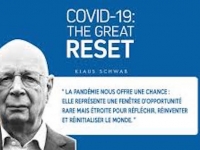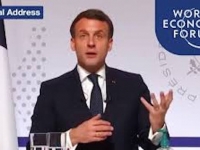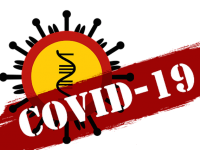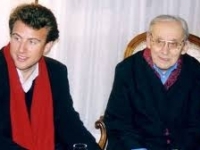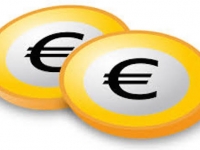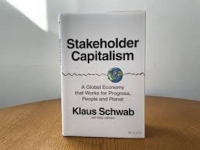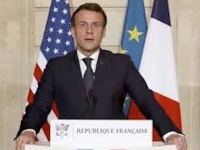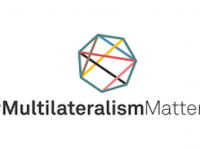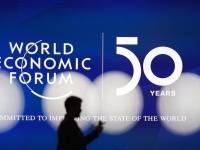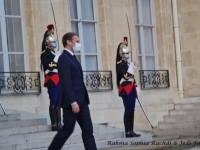Politics
PDT MACRON ANSWERED DIGITALLY TO KLAUS SCHWAB FOUNDER OF WEF DAVOS 2021
NOTHING IS ABOVE HUMAN VALUE HE SAID
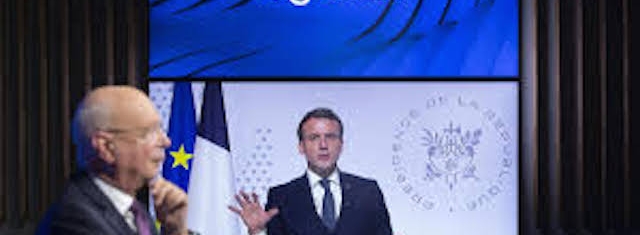
French Pdt Macron and Klaus Schwab Founder WEF (Source: Elysee Courtesy)
USPA NEWS -
The President of the French Republic Emmanuel Macron, met with Professor Klaus Schwab, founder of the World Economic Forum, DAVOS Summit, from the Palais de l'Elysée, Paris, on Tuesday January 26, 2021, which took place under the digital form. This year, the DAVOS Forum will be celebrating its most special and challenging edition, in the midst of the ongoing COVID pandemic. For this reason, the 51st edition of the World Economic Forum (World Economic Forum, WEF) will be held in two phases: An virtual one in January and another one, face-to-face, in May. The summit will convene politicians, businessmen and representatives of social and cultural organizations at a crucial time for the world, under the tagline « The Greatest Reset » French Head of State Macron answered Professor Klaus Schwab's questions, imagining the Post-COVID world economy, reinventing himself, in capitalism. This year, the Davos Forum is virtual, because of the COVID-19 epidemic, which is why French President Emmanuel Macron spoke on Tuesday at the World Economic Forum from the Elysee Palace. We are releasing the entire statement by President Macron on this occasion, recorded from the Elysee Palace. (Source Elysee
The President of the Republic Emmanuel Macron introduced the conversation with the founder of WEF, Davos “Hello, Professor Schwab, I am also very happy to see you again in this way, and thank you indeed for having organized these exchanges which, I believe , impose themselves even more in the period. I would like to make the connection between the world of today and the world after. First, because in all our countries, societies are changing with the experience we are going through. And I think we have a few lessons to learn from what we've all been going through together for a little over a year, and which will continue, we know, for months, some tell us, years. With in any case a more or less strong presence of this COVID-19 virus.
"WE CANNOT THINK THE ECONOMY WITHOUT HUMANS" SAID PDT MACRON------------------------------------------
I think the first thing it taught us was that you can't think of economics without people. So, it seems like a banality to say that, but anyway, we have done, in all our countries, something that was considered unthinkable, that is to say that we stopped all economic activities to protect people. lives. First lesson. And we remembered that the economy you speak of is a moral science and therefore that human life takes precedence over trade and numbers. " President Macron then spoke of his own experience of having been happy with COVID-19, to testify to our vulnerability to this coronavirus, and while drawing lessons from this unprecedented epidemic: "The second thing is that this period reminds us of our vulnerability, as an individual, if I may say so (I paid the price by catching it), but as an organization, company, society, country. And vulnerability means that we cannot think of our organizations about our economy without integrating it. And it was basically an idea that seemed to us - some were more aware than others about this subject - but which sometimes seemed distant to us when we spoke of ecology and climate. But it's the same notion. This is to say: what is happening around us has an impact on our daily life and can, in a way, break the chains, change our lives. Once I say that, it means that nothing can be rebuilt, in my opinion, in the post-COVID world that doesn't learn from these two fundamental elements. "
« THE ECONOMY HAS BECOME A MORAL SCIENCE & NOTHING IS ABOVE HUMAN VALUE » PDT MACRON-
President Macron underlined the importance of the relativity of the economy which is built by humans and to serve humans, whose value is supreme: "The economy has become a moral science again, and nothing is above human value; and our societies are vulnerable because nature reminds us of it and they are vulnerable to pandemic, climatic and other events. And so, the economy of tomorrow, strong of these lessons, but of what we also knew before, because there are also, we talk a lot about variants in this period, there are also invariants, well , the economy of tomorrow is in my eyes an economy that will have to think about innovation, vulnerability and humanity at the same time, and therefore which will have to build another compatible competitiveness and even help to resolve climate problems: reduction of CO2, adaptation of our societies because we are already having the consequences, biodiversity agenda.----------------------------------------------------------------------------
President Macron also insisted on the notion of resilience, and in particular since the arrival of new strains of COVID-19 called the variant: "It means an economy that will have to be more resilient to shocks and therefore integrate into its modes of protection of individuals, in its organizations from the elements of resistance, either in its production chains, or in its very fine logistics organizations elements of resilience - we can come back to this if you wish - and an economy that takes into account this principle of humanity, whether it is about health or social inequalities. And we had this problem, we talked about it together a year ago. And I believe that we will not come out of COVID-19 with an economy, I would say, that we will rather come out of COVID-19 with an economy that will have the problem of the fight against inequalities even more at its heart. These are the few convictions quickly described. "
PDT MACRON FRIEND OF PAUL RICOEUR HAS A MASTER IN 2001 OF PHILOSOPHY AT UNVERSITY OF NANTERRE---------------------------------------------------------------------------------------------------------------------------------------
Professor Klaus Schwab, founder of the DAVOS forum, then asked a philosophical question, a notion very dear to the President of the French Republic Emmanuel Macron reminding him of the notion of capitalism gone mad. The French head of state, very fervent reader of Hegel, holds a DEA in Philosophy in 2001 at the University of Nanterre, and became the editorial assistant of the philosopher Paul Ricoeur, (co-founder and former dean of the (University of Nanterre in the 1960s) replied with particular interest to Klaus Schwab: “Mr. President, I believe, last year you said in an OID meeting that capitalism has gone mad, and in the context that you say of a moral economy, what is your conception of the role of the company, of the philosophy of the company? I ask the question because today I published a book called “Stakeholder Capitalism“, which means stakeholder capitalism. What is your philosophy?-----------------------------------------------------------
The President of the Republic, Macron replied, from an economic point of view, while inserting the cartoons: "I find myself in the formula of stakeholder capitalism, but basically what is true is when we look the evolution of the last decades, we have a capitalism which, first of all, capitalism and the market economy have had real successes in the last decade, because we should not caricature things. It allowed the opening of economies. Global trade and capitalism have lifted hundreds of millions of people out of poverty. So that had an interest. It has made it possible to carry out a lot of innovations, it has made it possible to respond to the demands of the citizen consumer of our economies in an extraordinary way, with access to goods and services as rarely in humanity, we have there had access. So that is the tremendous success of the last decades. There is a way to all of this. The President of the Republic, Macron then recognized the re ers of the capitalist medal deepening the social inequalities: "It is that all this went with, one, obviously, of the creation of inequalities in our societies; that is to say that openness and the theory of comparative advantages made it possible to lift people and other fellow citizens out of poverty on the other side of the world to access production, but out of production and therefore activity, social utility, a real role and access to wages, many of our fellow citizens who have had to suffer from the relocation crises that all developed economies have had to experience. And it was a shock both economic and social for hundreds of millions around the world, in my country hundreds of thousands, if not millions of people who had this feeling of loss of usefulness, who lost their jobs. with a real economic and moral crisis. And somehow this problem, it has been externalized by the capitalism of the last decades. » He explains.
"THE FINANCING OF CAPITALISM HAS INCREASED SOCIAL INEQUALITY » SAYS PDT MACRON------------------
The President of the French Republic, Macron then explained the final aspect of capitalism and what this generates in terms of the gap between value and profit, at the origin of the increase in social inequality: "The second subject is the disconnect between the creation of value and profits. There is a financialization of this capitalism. Financialization is a very good thing when it allows you to go faster, when it allows for the proper allocation of savings towards financing needs. It's a bad thing when it somehow over-allocates remuneration, when there is little risk-taking and therefore it allows enrichments that are not linked to either a job or a phenomenon. innovation. And that's what happened. So, there was a kind of runaway which increased this first phenomenon of inequality. In all our societies, we have seen a growing inequality within them. "
President Emmanuel Macron then brought a third and fourth aspects that he argued in his response, as to the perverse effects of social networks, on globalization and the problem of climate change, which has necessarily become a global problem: "Third phenomenon , with the acceleration of social networks, it has globalized the imagination by also creating an unsustainability, if I may say so, systems of comparison, I would say this term, more and more difficult.
Fourth problem, it has totally externalized the climate problem for decades, that is to say, we have created global logistics, global trade. It was said basically, there are two kings in this system: the consumer and the shareholder, and the system has produced very well for the consumer and the shareholder, but it has adjusted on the worker and on the rest of the planet. And in a way, we created negative externalities, as we say modestly, in climatic terms. "President Emmanuel Macron thus summarized his argument:" These four phenomena have fueled the crisis of social inequalities, the crisis of democracy and the climate crisis. And so, the capitalist model married to the open market economy, it can no longer function in this environment. Why ? Because it has historically been the result of a compromise that was democratic societies, the free individual, individual freedoms, the progress of the middle classes which created sustainability in each of our societies. And it is in a way completely impacted, this balance, this consensus that there was, by these 4 accelerations. "
PDT MACRON BELIEVES IN KLAUS SCHWAB'S STAKEHOLDER CAPITALISM TITLE OF HIS BOOK-----------------
The President of the Republic, Macron then positions himself in accordance with the notion of Stakeholder Capitalism, of Klaus Schwab, adding to it the notion of importance of the role of the State: "And therefore, I, I believe very deeply in your Stakeholder Capitalism , among other things, that is to say in the idea of “‹“‹saying that we must put the answer to these problems back to the heart of the model. Basically, over the past few years, we have tried to respond with a response from the States. The State alone cannot do it because otherwise we have a problem, which is that the State is the only one to correct negative externalities. And therefore, it is becoming more and more indebted to pay alone for the response to climate problems, to pay for the response to inequalities on its own. And you kind of have a model where the public debt gets too big and / or it's the taxpayer who comes to pay for all these crises. The taxpayer is in a way the sedentary of this model and the one who cannot derive all the benefits from it either.
«WE ARE BUILDING DESPITE ALL THE FUTURE OF HUMANITY BY KEEPING THE FUNDAMENTALS OF THE CAPITALIST MODEL "SAID PDT MACRON---------------------------------------------------------------------------------------------
President Emmanuel Macron thus concluded: "This is why my conviction is that the capitalist model, because I still believe that we will build the future of humanity by keeping a few fundamentals: private property, cooperation, individual and collective freedoms which have made our societies. And therefore, that all this must simply lead to rethinking our organizations to reintegrate into the heart of the company. Well, taking into account social inequalities in our countries, inequalities between different geographical areas, the climatic consequences that we are experiencing, among others “. The President of the French Republic added, to finish answering with regard to economic, social and democratic actions: "And basically, what we have in recent years called the economic, environmental and social responsibility of our companies, the approach through the impact of our companies, these are innovations that we must now push much further and we must reform our companies within them so that at their heart, so that, in a way, all the parties stakeholders, therefore stakeholders, employees, managers and shareholders integrate into their behavior, but also in what we measure, well, the impact of their actions in economic, social, environmental and democratic terms. "----------------------------------------------------------------------
Professor Klaus Schwab, founder of WEF, DAVOS, then made an announcement today, regarding the commitment to social responsibility and questioned President Macron, on the progress of the Paris climate agreement: " You mentioned that I am very happy, Mr. Chairman, to tell you that today, we announced the commitment of the company here virtually, to report regularly according to very exact criteria on progress. that they do in their social responsibility, ecological and also with regard to gout [inaudible]. I would like to resume ecology. I also believe with the commitment now of the Government of the new American administration to the objectives of the Treaty of Paris. My question, we have certainly made a lot of progress, but I ask you: are you satisfied with this progress? Or will you want some sort of new consensus that goes beyond what has been discussed and decided before? "
« TODAY WE ARE NOT ALL TOGETHER WITH THE AGENDA OF THE PARIS AGREEMENT "SAID PDT MACRON
The President of the French Republic answers Professor Klaus Schwab's question on the effects and progress of the Paris agreement: “I think several things on this subject. First, we have a question of implementation, we discussed and agreed on many things: a climate agenda, the Paris agenda. And today, we are not there all together, exactly our actions. And so, I think that the priority of priorities is in a coordinated manner, to do everything to keep our commitments. I say coordinated because somehow the stowaway can destroy the whole system. All this only works if we move forward together at the same pace so as not to create competitive bias. And it is in this that the last years have been crucial when the United States of America decided to leave the Paris agreement, in the summer of 2017, there was a great risk.---------------------------------------------------
President Macron adds that the One Planet Summit, its intuitive launch in 2017, also involves the action of emerging countries, recalling the concept of reducing emissions by -55%, and carbon neutrality to be achieved by 2050: “And me, I still look at the years that have just passed as years of tremendous resistance where the house of cards did not collapse because we all held together, we created this One Planet Summit initiative on December 12 2017 with these coalitions. All together we held, Europeans, with many emerging and developed countries, with China it must also be said which cooperated very strongly and with the private sector and the American federated states. And there we have an American administration whose first gesture is to return to the Paris agreements. So my first goal is to have these Paris agreements; raising our 2030 objectives, we did it in Europe last December with the reduction of emissions as we said, -55%, which is a very important objective. Second point, carbon neutrality 2050. These are the two absolutely decisive crossing points for structuring our behavior in the coming years. Behind this, we need to develop these strategies at regional and national level and this is the hardest part, that is to say having a sufficiently high carbon price, mechanisms that encourage our companies and our investors to go faster in management, support and sanction mechanisms so that companies and households can move faster and stronger, that we renew our vehicle fleet more quickly, that we change the renovation of our buildings faster , etc. etc. So that is the first pillar, it is essential. " he said.
THE SOVEREIGN WEALTH FUNDS, ASSET MANAGERS AND PRIVATE EQUITY SET UP DURING THE ONE PLANET SUMMIT OF 12/12/2020----------------------------------------------------------------------------------------------------------
The French President, Emmanuel Macron then explained the most crucial aspect which is the financial pillar of the application of the Paris Agreement, discussed during the One Planet Summit: “The second pillar, it is to embark really everything the financial sector and all companies and that ties in with the discussion we had just before. We have very important coalitions in this regard, and I strongly believe in the initiative that we put in place with the One Planet Summit, of sovereign wealth funds, asset managers and private equity. And we brought it together on December 12 in virtual mode. And now, we have succeeded in generalizing, in effect, the same nomenclature. Everyone is involved with the task force for Climate-related financial disclosure, TCFD, which is a real step forward in this regard. We have the same methodology and we are moving forward. So the investors are committed to a measurement methodology which corresponds exactly to what you have just said and which, now, is being applied to companies. And for example, last December, on December 12, the 40 French CAC 40 (The 40 companies listed in the French Stock Market) companies integrated this methodology. This means that they will have to report to their shareholders, to the markets, the fact that they themselves comply with its commitments and that they are making efforts. "--------------------------------------------------------------------------------------------------------------
The third pillar of our action is that we do the same thing on biodiversity. I really believe that we will only keep the climate commitment if we manage to commit our companies, our investors, our countries to a biodiversity agenda. This is the whole point of what we have done with One Health, which is to bring together our subject human health, biodiversity, the fight against global warming and against desertification. But I truly believe that we are still only at the beginning on the climate, on biodiversity. And that's very important because it's changes in production in our agriculture, it's changes in our consumption pattern, in our way of life. And so there, we have to build this year the common rules. And so when you say what more must we succeed in negotiating? Well, I think that at the Kunming COP, we must succeed in negotiating the equivalent of the Paris agreement for biodiversity. A few days ago in Paris, we gathered in virtual mode, a One Planet Biodiversity Summit, it was the first of its kind. We have taken several very strong initiatives: the Great Green Wall, precisely, in 11 countries of the Sahel and the Horn of Africa, to succeed in the fight against desertification; a lot of biodiversity initiatives. And we have launched an initiative, again, of disclosure in financial matters to integrate biodiversity into these criteria, with a meeting to be held this summer. And so, that is the key point. These are the three pillars.
Professor Klaus Schwab asks President Macron: “Mr. President, if we take all these changes, does that also mean a new mode of globalization? Is this also, as they say, a "new normal" for globalization? " ----------------------------------------------------------
The President of the Republic Emmanuel Macron replied to Professor Klaus Schwab, about the Paris consensus and the achievement of the New Normal. "" So completely. I'm going to tell you, everything we're saying converges for me on three elements. The first is to build a new consensus. Last November 11, during the Paris Peace Forum, we tried to bring together heads of state and government, NGOs, international organizations, intellectuals to try to think about what we have called very immodestly the Paris consensus. It is the consensus everywhere, whatever, but to say several decades after the Washington consensus, we must build a new consensus whose rules are not the reduction of the State, the decline of the public sector and the creation of value only for the shareholder. And so we have to build, and this is exactly the discussion we have been having together for a while, a new consensus that integrates all of this and puts it back at the heart of the model."
"WE MUST BUILD AN EFFECTIVE MULTILATERALISM" SAID PRESIDENT MACRON------------------------------------
The French Head of State Macron, addressed the second point, the aspect of a wish for more effective multilateralism, a subject he particularly likes, since he had defined during his opening speech at the UN General Assembly, in September 2017, He then declared “Today more than ever we need multilateralism. It is the rule of law, it is exchange between peoples, it is equality, it is what makes it possible to build peace and meet each of our challenges. "------------------------------------------
“Second point, we have to find a new mode of cooperation between States, that is to say, find effective multilateralism. This is what I have believed in for years. It was blocked, in fact, by an American administration which did not believe in it. I have a lot of hopes at the start of this year with an American partner, I hope, who will re-engage, and therefore we must build an effective multilateralism that will allow us to respond and implement this new consensus. And then, third thing, we need to build these new coalitions, the very ones we tried to build as part of the One Planet Summits. That is to say that basically, to respond to these challenges, the “new normal“ of which you speak is an interaction and in this respect I salute the very innovative character of your forum, for decades you have thought that is to say cooperation, but in concrete terms between States, NGOs, companies, investors. That is to say that this “new normal“ we are talking about, the staging of consensus, is not just intergovernmental multilateralism, it is coalitions of heterogeneous actors who set the same objectives for have results. "
"IN THE DIGITAL THERE ARE SEVERAL REVOLUTIONS IN ONE" SAID PRESIDENT MACRON-----------------------
Professsor Klaus Schwab, questions President Macron on his interest in new technologies, one of his favorite subjects, he who wanted to develop the digital field of France towards a "start up nation": "Mr. President, that gives a reason for asking you: I know your interest in all new technologies, in what is called the fourth industrial revolution, but in all its conception, let's say, digital plays a very big role. How do you see the impact of the power of the digital ecosystem on everything you've said? President Macron replied: “I think there are several. The first is that we are indeed multiplying revolutions when we talk about digital. There are several revolutions in one. We are at the beginning of several technological revolutions which are causing us to completely change dimension. We have the artificial intelligence revolution, which is going to totally change productivity and even go beyond the thinkable in a lot of verticals, from industry to health to space. Next to the artificial intelligence revolution, there is a second one which, for me, is totally fundamental, which is that of quantum, which also goes there, through the power of calculation and the capacity for innovation, deeply change our industry, by changing the sensor industry and therefore what we can do in aeronautics, what we can do in civilian life, totally change the reality of cyber, for example; and our power to calculation, which also means the ability to solve problems. I take the epidemic that we are experiencing, artificial intelligence and quantum are instruments of management, of transformation of management of the epidemic. That is, you will be able to solve problems that today take weeks, in a day. You'll be able to fix diagnostic problems, perhaps in seconds, through the intersection of medical imaging and artificial intelligence. And so in the big family of what is called digital, we actually have a convergence between innovations, those of digital, which is basically, when we call it generically, social networks and hyper connectivity with that of artificial intelligence and quantum technologies. "
"THE ACCELERATION OF INNOVATION WILL CREATE VALUE AND THEREFORE OF IMPACT" SAID PDT MACRON-----------------------------------------------------------------------------------------------------------------------------------------
President Macron continues his explanation as to the efficiency of the digital push in innovation thus creating value and its force of impact: "The marriage of all this means that we are going to enter an era of acceleration of the innovation, a very profound break in innovation and therefore the ability to commoditize certain industries and create value very quickly. Compared to what I said, what impact does this have? One, we will continue to innovate and accelerate. It's certain. Two, there will be social adjustment impacts and we need to think about them now. That is to say, the subject of social inequalities will be even more significant in a world like the one I just mentioned because we will have impacts, adjustments that will be real and that need to be considered from now on. Three, all of this has massive democratic impacts. And so if you like, for me, these innovations will be accelerators of our problems on the social and democratic level. The American experience of the past few weeks has shown this democratically, if need be. Four, the good news is that I think that on the resilience of our systems and the response to the climate crisis, we have undoubtedly underestimated the contribution of innovation and I also think that all these technologies are going to help us. allow, much faster, to respond to climate challenges.------------------------
And so if I look, that I take two steps back from everything we are saying to each other, I think that our economies will have to invest more and more in these innovations and we have to go all out . I think that if we do it well and cooperate with each other, these innovations will allow us to create value, to respond to economic challenges. They will allow us, I hope, I believe possible, to respond more quickly to climate challenges. And that's also why I believe in what I call the best economy, the climate response through innovation rather than shutting down. But they will pose problems for us that we have not given enough thought to in democratic terms, in terms of public freedoms and increasing social inequalities in our various nations. "Said the President of the French Republic Emmanuel Macron, after his meeting with the founder of the World Economic Forum Davos.
To conclude, this interview, Professor Klaus Schwab, thanked President Macron in a digital way, Mr. President, it was truly an integral vision of our future. But our future will not happen automatically, we have to build it. And I am happy, we saw, through your presentation, that there are people and leaders who have a very clear perspective of how this future should be - what should be this future that we want to build for the good of everyone. So a big thank you, Mr. President, and I'm sorry that technology, for a while, with the line between Paris and Geneva, has in store for us some surprises. But I think it was a great event looking ahead. Thank you very much Mr. President of the Republic. See you soon, goodbye Mr. President. "-------
The President of the Republic finally thanked Professor Klaus Schwab as well as the other participants of WEF of DAVOS, 2020: “Thank you Professor, thank you dear Klaus and I thank everyone. Indeed, we are sometimes immersed in everyday life, but I think it is also important - and thank you for giving me the opportunity - to try to look together on the course and discuss these subjects. And your conclusion says it very well, I share it and I will stop on it, let's never forget that our goal is always in society to build the good life, with the virtues that go with it and the will to respect the other . And I think that is in the service of this objective that we must put each of our actions. So thank you very much, best wishes and I hope to see you very soon physically. "The President of the Republic concluded, for his part, from the Elysee Palace, by thanking Professor Klaus Schwab, founder of the World Economic Forum Davos, being held this year, virtually, given the COVID-19 pandemic "Thank you very much, thank you Klaus, thank you Professor. ../" Source: Elysee Administration
French President Macron Klaus Schwab Founder World Economic Forum Wef Davos Stakeholder Capitalism Human Value Multilateralism One Planet Summit Elysee Covid-19 Rahma Sophia Rachdi Jedi Foster
Liability for this article lies with the author, who also holds the copyright. Editorial content from USPA may be quoted on other websites as long as the quote comprises no more than 5% of the entire text, is marked as such and the source is named (via hyperlink).

